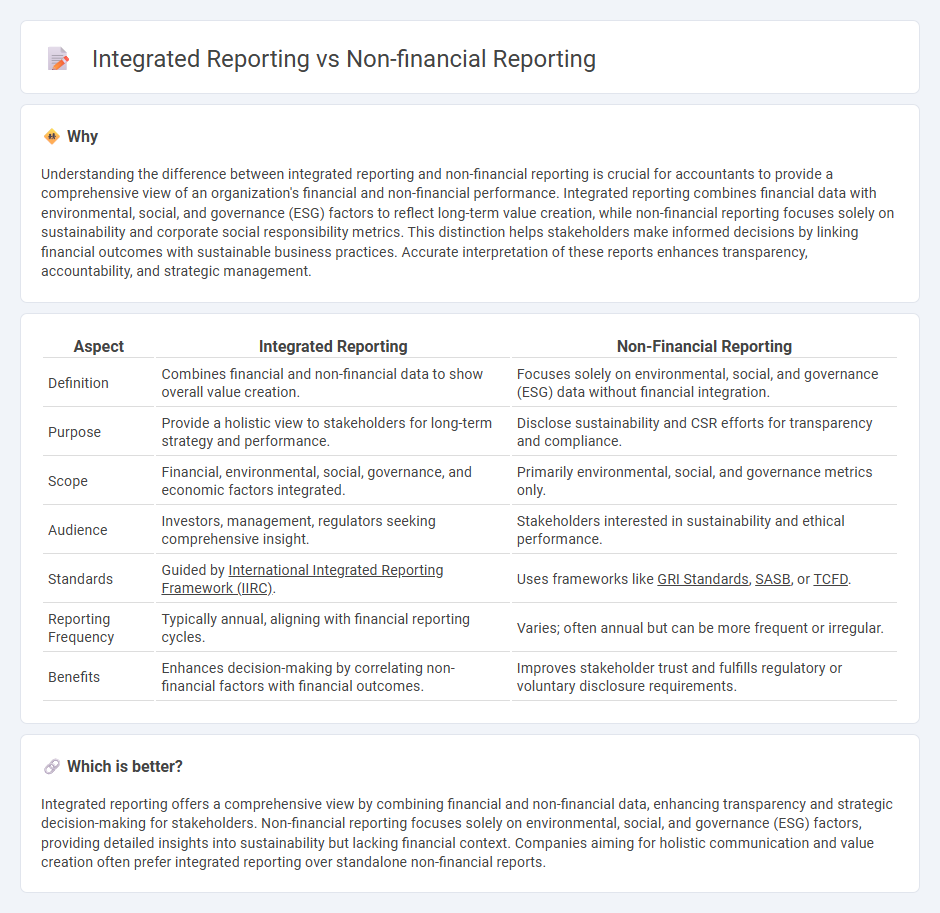
Integrated reporting combines financial and non-financial data to provide a holistic view of an organization's value creation over time, enhancing transparency and decision-making for stakeholders. Non-financial reporting focuses on environmental, social, and governance (ESG) metrics, highlighting a company's sustainability and social responsibility performance. Explore how integrated reporting offers a comprehensive framework that goes beyond traditional non-financial disclosures for deeper insights.
Why it is important
Understanding the difference between integrated reporting and non-financial reporting is crucial for accountants to provide a comprehensive view of an organization's financial and non-financial performance. Integrated reporting combines financial data with environmental, social, and governance (ESG) factors to reflect long-term value creation, while non-financial reporting focuses solely on sustainability and corporate social responsibility metrics. This distinction helps stakeholders make informed decisions by linking financial outcomes with sustainable business practices. Accurate interpretation of these reports enhances transparency, accountability, and strategic management.
Comparison Table
| Aspect | Integrated Reporting | Non-Financial Reporting |
|---|---|---|
| Definition | Combines financial and non-financial data to show overall value creation. | Focuses solely on environmental, social, and governance (ESG) data without financial integration. |
| Purpose | Provide a holistic view to stakeholders for long-term strategy and performance. | Disclose sustainability and CSR efforts for transparency and compliance. |
| Scope | Financial, environmental, social, governance, and economic factors integrated. | Primarily environmental, social, and governance metrics only. |
| Audience | Investors, management, regulators seeking comprehensive insight. | Stakeholders interested in sustainability and ethical performance. |
| Standards | Guided by International Integrated Reporting Framework (IIRC). | Uses frameworks like GRI Standards, SASB, or TCFD. |
| Reporting Frequency | Typically annual, aligning with financial reporting cycles. | Varies; often annual but can be more frequent or irregular. |
| Benefits | Enhances decision-making by correlating non-financial factors with financial outcomes. | Improves stakeholder trust and fulfills regulatory or voluntary disclosure requirements. |
Which is better?
Integrated reporting offers a comprehensive view by combining financial and non-financial data, enhancing transparency and strategic decision-making for stakeholders. Non-financial reporting focuses solely on environmental, social, and governance (ESG) factors, providing detailed insights into sustainability but lacking financial context. Companies aiming for holistic communication and value creation often prefer integrated reporting over standalone non-financial reports.
Connection
Integrated reporting combines financial and non-financial reporting to provide a comprehensive view of an organization's performance, strategy, and value creation over time. Non-financial reporting includes environmental, social, and governance (ESG) data, which is essential for assessing sustainability and long-term risks. This connection enhances transparency and supports stakeholders in making informed decisions beyond traditional financial metrics.
Key Terms
Non-financial reporting:
Non-financial reporting emphasizes the disclosure of environmental, social, and governance (ESG) factors to provide stakeholders with insights into a company's sustainability and ethical impact. It includes metrics such as carbon emissions, labor practices, and community engagement, which are essential for assessing long-term business risks and opportunities beyond financial performance. Explore how non-financial reporting drives transparency and accountability in corporate strategy.
Sustainability
Non-financial reporting emphasizes environmental, social, and governance (ESG) factors, providing stakeholders with qualitative and quantitative data on a company's sustainability impact. Integrated reporting combines financial and non-financial data into a cohesive framework, illustrating how sustainability influences overall business strategy and value creation. Explore deeper insights into how these reporting methods drive sustainable business performance and transparency.
Corporate Social Responsibility (CSR)
Non-financial reporting emphasizes disclosing a company's environmental, social, and governance (ESG) practices, providing transparency on Corporate Social Responsibility (CSR) initiatives without financial data integration. Integrated reporting combines financial and non-financial information to present a holistic view of how CSR efforts contribute to long-term value creation and business strategy. Explore the nuances between these reporting frameworks to enhance your understanding of CSR communication.
Source and External Links
Non-financial reporting: responsible, far-sighted management - PwC - Non-financial reporting involves disclosing information beyond financial figures to explain key themes impacting an organization, such as sustainability and corporate responsibility, helping assure long-term value to stakeholders, primarily relevant for large multinational companies.
A Comprehensive Guide to Non-Financial Reporting - Non-financial reporting covers environmental, social, and governance (ESG) impacts with four main standards--CSRD, ISSB, CDP, and GRI--each serving different purposes but increasingly aligned to help companies meet transparency and tax disclosure obligations globally.
A deep dive into the rise of non-financial reporting and what it means for business - Non-financial reporting standards require companies worldwide to regularly disclose ESG data such as greenhouse gas emissions, social metrics, and governance practices, with voluntary or mandatory frameworks supporting transparency and enabling capital flow toward sustainable projects.
 dowidth.com
dowidth.com